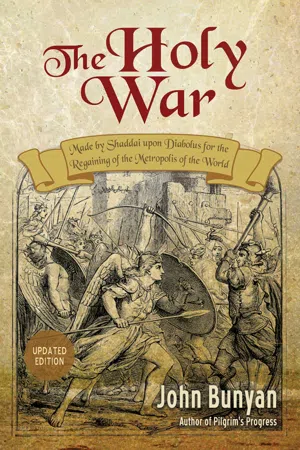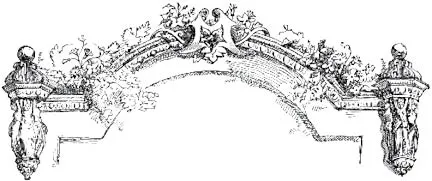![]()
I would quote John Bunyan as an instance of what I mean. Read anything of [John Bunyan’s] and you will see that it is almost like reading the Bible itself. He had read it till his very soul was saturated with Scripture; and, though his writings are charmingly full of poetry, yet he cannot give us his Pilgrim’s Progress — that sweetest of all prose poems — without continually making us feel and say, ‘Why, this man is a living Bible!’ Prick him anywhere; his blood is Bibline; the very essence of the Bible flows from him. He cannot speak without quoting a text, for his very soul is full of the Word of God. I commend his example to you, beloved.
Charles Spurgeon
It was during this second detention that he wrote the work which has set him finally among the English immortals, The Pilgrim’s Progress. Many controversies have raged as to whether he owed the allegorical type of narrative to anything before him, but all the allegories mentioned in this connection are almost as unlike The Pilgrim’s Progress as they are unlike Vanity Fair. The Elstow tinker produced an original thing, if an original thing was ever produced. Nothing stronger can be said of it than that it dwarfs altogether into insignificance Grace Abounding published before it, and The Holy War published afterwards.
G. K. Chesterton
Anyone who is honestly trying to be a Christian will soon find his intelligence sharpened; one of the reasons why it needs no special education to be a Christian is that Christianity is an education itself. That is why an uneducated believer like Bunyan was able to write a book that has astonished the whole world.
C. S. Lewis
John Owen, probably the most prominent and respected academic leader of Bunyan’s own era, once went to hear Bunyan preach. Charles II, hearing of it, asked the learned doctor of divinity why someone as thoroughly educated as he would want to hear a mere tinker preach. Owen replied, “May it please your Majesty, if I could possess the tinker’s abilities to grip men’s hearts, I would gladly give in exchange all my learning.”
Charles II, king of Great Britain
The Holy War
Made by Shaddai upon Diabolus for the
Regaining of the Metropolis of the World
John Bunyan
![]()
Register This New Book
Benefits of Registering*
- FREE replacements of lost or damaged books
- FREE audiobook – Pilgrim’s Progress, audiobook edition
- FREE information about new titles and other freebies
www.anekopress.com/new-book-registration
*See our website for requirements and limitations.
![]()
Contents
Preface
To the Reader
Ch. 1: Mansoul: Its Origin
Ch. 2: The Fall of Mansoul
Ch. 3: The Enslavement of Mansoul
Ch. 4: The King’s Message of Mercy
Ch. 5: Shaddai Sends His Army
Ch. 6: The King’s Offer
Ch. 7: Winter in Mansoul
Ch. 8: Diabolus Offers Compromise
Ch. 9: The Coming of Emmanuel
Ch. 10: Emmanuel Remains Firm
Ch. 11: Emmanuel Confronts Diabolus
Ch. 12: Emmanuel’s Victory
Ch. 13: Petitions from Prison
Ch. 14: Prisoners Set Free
Ch. 15: Emmanuel Enters Mansoul
Ch. 16: Mansoul Made New
Ch. 17: Trials of the Diabolians
Ch. 18: Mansoul Is Made New
Ch. 19: Deceived by Carnal-Security
Ch. 20: Godly-Fear Speaks Out
Ch. 21: Diabolus’s Plan
Ch. 22: Diabolians Prepare for War
Ch. 23: Mansoul Prepares
Ch. 24: Drummings and Deceit
Ch. 25: Attack on Mansoul
Ch. 26: Petition to the Prince
Ch. 27: Plans to Take the Castle
Ch. 28: Battle on the Plains
Ch. 29: Emmanuel Restored to Mansoul
Ch. 30: Final Attack
Ch. 31: Judgment Day
Ch. 32: Emmanuel’s Message
Bonus Section: The Life of John Bunyan
Glossary of Names Used in The Holy War
About the Author
“I have used similitudes.” I have also spoken by the prophets, and I have multiplied visions, and used similitudes, by the hand of the prophets. (Hosea 12:10)
![]()
Preface
In the year 1682, Dorman Newman published a volume at the King’s Arms in the Poultry, and Benjamin Alsop published the same manuscript at the Angel and Bible in the Poultry. This book was entitled The Holy War Made by King Shaddai Upon Diabolus, to Regain the Metropolis of the World, or The Losing and Taking Again of the Town of Mansoul. It was the work of John Bunyan, who had published the story of his own spiritual struggle sixteen years before, under the title of Grace Abounding to the Chief of Sinners, and had produced The Pilgrim’s Progress (Part 1) four years before. Bunyan quickly followed The Pilgrim’s Progress with the Life and Death of Mr. Badman, a grimly factual picture of English life and character as seen through his eyes.
In The Holy War, Bunyan returned to allegory, and as a piece of literature, the book is in no way inferior to The Pilgrim’s Progress. If Bunyan had written nothing else, The Holy War would have established his place among the masters of English prose. In its appeal to the conscience, it is no less effective than The Pilgrim’s Progress; however, it is not as successful at holding the reader’s attention. Nevertheless, Macaulay suggests that if there had been no Pilgrim’s Progress, then The Holy War would have been the first of religious allegories.
In working out the details of The Holy War, Bunyan seems to have kept in mind his own experience. The fortifications of the city, the movements of opposing forces, and the changes in the municipal offices of Mansoul were reproductions of scenes and events he had recently witnessed. He adapted these real-life experiences with extraordinary success and used them to present the doctrine of grace and the temptations present in the Christian life.
The characters and the incidents are, in effect, the characters and incidents of every age. This element gives the story of Mansoul an undying freshness, which suits the needs of men throughout the world. The Holy War has been translated into many languages, including some with very little literature. (As the 1907 edition was being prepared for the press, the Religious Tract Society helped with the printing of The Holy War in Kongo.)
– A. R. Buckland
![]()
To the Reader
’Tis strange to me, that they who love to tell
Things done of old, yes, and who do excel
Their equals in the knowledge of history,
Do not speak of Mansoul’s wars, but let them lie
Dead, like old fables, like such worthless things,
Knowledge of which no advantage brings.
Let men make what they will their own,
But till they know this, to themselves are unknown.
Of stories, I well know there are various sorts,
Some foreign, some domestic, and some reports
Created and written as thought leads the writers:
(By books a man may speculate about the composers)
Some will repeat that which never was,
Nor will be, to tear it down (and that without a cause)
Such subjects raise mountains from things small, tell such things
Of men, of laws, of countries, and kings.
While their story seems to be quite sage,
Such gravity clothes every page,
Though their front illustration says all is vain,
Yet, in this way, disciples they obtain.
But, readers, I have other important things to do,
Than to write worthless stories to thus trouble you.
What I say here, some men know so well,
They can with tears of joy the story tell.
The town of Mansoul is well known to many,
Her troubles are not doubted by any
Be familiar with those histories and reflect
That Mansoul and her wars dissect.
Then lend your ear to hear what I relate,
Regarding the town of Mansoul and her state.
How she was lost, took captive, made a slave,
And set against Him who would her save;
How by hostile ways she did oppose
Her Lord, and with his enemy arose.
For it is true: he that will them deny
Must then the best of records vilify.
For my part, I myself was in the town,
Both when ‘twas set up, and falling down.
I saw Diabolus take Mansoul into his possession,
And cause her to live under his oppression.
Yes, I was there when she avowed him as Lord,
And to him did submit with one accord.
When Mansoul trampled upon things divine,
And wallowed in filth as does a swine;
Then she actually resorted to arms,
Fought Emmanuel; abhorred His charms.
I admit I was there, and rejoiced to see
Diabolus and Mansoul so agree.
Let no men, then, deem me a fable-maker,
Nor mark my name or credit me a partaker.
Of their derision: what is here in view,
From my own knowledge, I dare say is true.
I saw the Prince’s armed men come down
By troops, by thousands, to besiege the town;
I saw the captains, heard the trumpets sound,
A...






